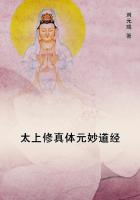But when morning dropped anchor at the rim of the East, the beggar in me leapt and cried:
“Blessed am I that the deaf night denied me-that its coffer was empty.”
He cried, “O Life, O Light, you are precious! and precious is the joy that at last has known you!”
Sanatan was telling his beads by the Ganges when a Brahmin in rags came to him and said, “Help me, I am poor!”
“My alms-bowl is all that is my own,” said Sanatan, “I have given away everything I had.”
“But my lord Shiva came to me in my dreams,” said the Brahmin, “and counselled me to come to you.”
Sanatan suddenly remembered he had picked up a stone without price among the pebbles on the river-bank, and thinking that some one might need it hid it in the sands.
He pointed out the spot to the Brahmin, who wondering dug up the stone.
The Brahmin sat on the earth and mused alone till the sun went down behind the trees, and cowherds went home with their cattle.
Then he rose and came slowly to Sanatan and said,“Master, give me the least fraction of the wealth that disdains all the wealth of the world.”
And he threw the precious stone into the water.
Time after time I came to your gate with raised hands, asking for more and yet more.
You gave and gave, now in slow measure, now in sudden excess.
I took some, and some things I let drop; some lay heavy on my hands; some I made into playthings and broke them when tired; till the wrecks and the hoard of your gifts grew immense, hiding you, and the ceaseless expectation wore my heart out.
Take, oh take-has now become my cry.
Shatter all from this beggar"s bowl: put out this lamp of the importunate watcher: hold my hands, raise me from the still-gathering heap of your gifts into the bare infinity of your uncrowded presence.
You have set me among those who are defeated.
I know it is not for me to win, nor to leave the game.
I shall plunge into the pool although but to sink to the bottom.
I shall play the game of my undoing.
I shall stake all I have and when I lose my last penny I shall stake myself, and then I think I shall have won through my utter defeat.
A smile of mirth spread over the sky when you dressed my heart in rags and sent her forth into the road to beg.
She went from door to door, and many a time when her bowl was nearly full she was robbed.
At the end of the weary day she came to your palace gate holding up her pitiful bowl, and you came and took her hand and seated her beside you on your throne.
“Who among you will take up the duty of feeding the hungry?”
Lord Buddha asked his followers when famine raged at Shravasti.
Ratnakar, the banker, hung his head and said, “Much more is needed than all my wealth to feed the hungry.”
Jaysen, the chief of the King’s army, said,“I would gladly give my life’s blood, but there is not enough food in my house.”
Dharmapaal, who owned broad acres of land, said with a sigh, “The drought demon has sucked my fields dry. I know not how to pay King’s dues.”
Then rose Supriya, the mendicant’s daughter.
She bowed to all and meekly said, “I will feed the hungry.”
“How!” they cried in surprise.“How can you hope to fulfil that vow?”
“I am the poorest of you all,” said Supriya, “that is my strength. I have my coffer and my store at each of your houses.”
My king was unknown to me, therefore when he claimed his tribute, I was bold to think I would hide myself leaving my debts unpaid.
I fled and fled behind my day’s work and my night’s dreams.
But his claims followed me at every breath I drew.
Thus I came to know that I am known to him and no place left which is mine.
Now I wish to lay my all before his feet, and gain the right to my place in his kingdom.
When I thought I would mould you, an image from my life for men to worship, I brought my dust and desires and all my coloured delusions and dreams.
When I asked you to mould with my life an image from your heart for you to love, you brought your fire and force, and truth, loveliness and peace.
“Sire,” announced the servant to the King, “the saint Narottam has never deigned to enter your royal temple.”
“He is singing God’s praise under the trees by the open road.”
The temple is empty of worshippers.
“They flock round him like bees round the white lotus, leaving the golden jar of honey unheeded.”
The King, vexed at heart, went to the spot where Narottam sat on the grass.
He asked him, “Father, why leave my temple of the golden dome and sit on the dust outside to preach God’s love?”
“Because God is not there in your temple,” said Narottam.
The King frowned and said, “Do you know, twenty millions of gold went to the making of that marvel of art, and it was consecrated to God with costly rites?”
“Yes, I know it,” answered Narottam.“It was in that year when thousands of your people whose houses had been burned stood vainly asking for help at your door.”
“And God said, ‘The poor creature who can give no shelter to his brothers would build my house’!”
“And he took his place with the shelterless under the trees by the road.”
“And that golden bubble is empty of all but hot vapour of pride.”
The King cried in anger, “Leave my land.”
Calmly said the saint,“Yes, banish me where you have banished my God.”
The trumpet lies in the dust.
The wind is weary, the light is dead.
Ah, the evil day!
Come, fighters, carrying your flags, and singers, with your war-songs!
Come, pilgrims of the march, hurrying on your journey!
The trumpet lies in the dust waiting for us.
I was on my way to the temple with my evening offerings, seeking for a place of rest after the day"s dusty toil: hoping my hurts would be healed and the stains in my garment washed white, when I found thy trumpet lying in the dust.
Was it not the hour for me to light my evening lamp?
Had not the night sung its lullaby to the stars?
O thou blood-red rose, my poppies of sleep have paled and faded!
I was certain my wanderings were over and my debts all paid when suddenly I came upon thy trumpet lying in the dust.
Strike my drowsy heart with thy spell of youth!
Let my joy in life blaze up in fire. Let the shafts of awakening fly through the heart of night, and a thrill of dread shake blindness and palsy.
I have come to raise thy trumpet from the dust.
Sleep is no more for me-my walk shall be through showers of arrows.
Some shall run out of their houses and come to my side-some shall weep.
Some in their beds shall toss and groan in dire dreams.
For to-night thy trumpet shall be sounded.
From thee I have asked peace only to find shame.















